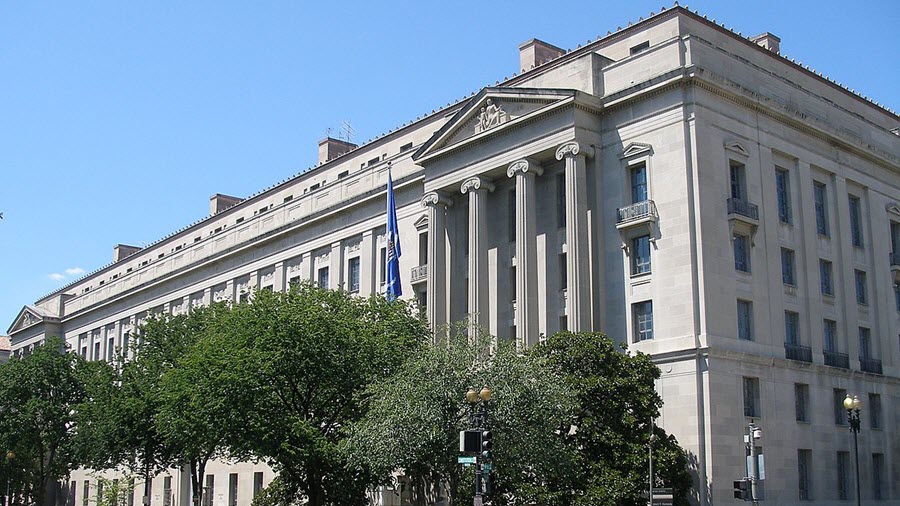DOJ Slams AT&T 'Revisionist' Defense of Time Warner Deal

The smarter way to stay on top of broadcasting and cable industry. Sign up below
You are now subscribed
Your newsletter sign-up was successful
The Justice Department has minced no words in its reply to AT&T's defense of its purchase of Time Warner, telling a federal court that the company's brief was "little more than a revisionist 58-page summary of the district court’s opinion."
That district court had rejected DOJ's challenge to the deal on antitrust grounds.
Related: Delrahim Tells Hill DOJ Was Forced to Challenge AT&T-TW
Antitrust chief Makan Delrahim said AT&T's brief "never resolves the district court’s erroneous rejection of the economics of bargaining and the principle of corporate-wide profit maximization, which are the basis of our appeal.” DOJ says the court's main error was "that the merger will not increase AT&T’s bargaining leverage."
The revisionism, says Justice, is that it says the company attempted to construct "a new opinion, incorrectly elevating a handful of the court’s musing footnotes and phrases as if they were holdings."
“AT&T defends the court’s flawed rejection of [the government’s economic expert] testimony by attempting to elide that the court used the wrong number for consumer savings: AT&T simply swaps a different number into its brief without any explanation how the court could have reached it," DOJ said. "These bold attempts to rescue-by-revising the court’s opinion are starkly inconsistent with AT&T’s repeated ode to deference—and only reinforce the need for remand."
“AT&T unsuccessfully attempts to justify the district court’s conclusion that Time Warner would not bargain with DirecTV’s interests in mind," Justice added. "Given the district court’s illogical conclusion that the merger will lead to no change in bargaining leverage, and its erroneous finding of no consumer harm, a remand is necessary," DOJ told the court.
The smarter way to stay on top of broadcasting and cable industry. Sign up below
Justice's final brief was responding to AT&T's Sept. 20 brief in the case, in which DOJ is asking the U.S. Court of Appeals for the D.C. Circuit to reverse the district court judge decision.
In that Sep. 20 brief, AT&T told the court that the lower court was right to rule that the Justice Department failed to prove that its merger with Time Warner would allow it to raise prices for Turner content (CNN, TNT, and TBS). AT&T says Justice can't meet the burden of proving the lower court erred, which would be necessary to overturn that ruling or remand it back.
AT&T said DOJ's claim that the lower court made economic errors was wrong, and even if it were right, that was irrelevant given the combined AT&T-TW pledge to have third-party arbitration of any complaints about Turner programming availability, and a no-blackout policy during that process.
Justice initially filed suit against the deal, arguing that the combination of Turner’s competitively significant programming with the vast distribution footprint of AT&T's DirecTV made it an "exceptional vertical merger" whose effect would be to raise prices and lessen competition, particularly from over-the-top competitors. It said the judge failed to recognize that basic economic fact.
U.S. District Court Judge Richard Leon ruled on June 12, after a six-week trial, that the government had failed to prove its case that the merger would not be in the public interest.
“Our opinion of the government’s lawsuit is no secret, and we appreciate former Attorney General Barr stepping forward to provide his first-hand account of DOJ’s interactions with us in the days prior to filing suit," said AT&T in a statement. The reference was to a February 2018 sworn declaration to the court from William Barr, attorney general under George H.W. Bush and a Time Warner board member, who took issue with Delrahim's characterization of a meeting they both attended about the deal.
Barr says Delrahim's version was "inaccurate and incomplete," and that his discomfort at that meeting stemmed from Barr's concerns that "Mr. Delrahim's position about the alleged harms from the merger and his inexplicable...rejection of remedies short of extreme divestitures were the product not of a well-versed substantive analysis, but rather political or other motivation."
Contributing editor John Eggerton has been an editor and/or writer on media regulation, legislation and policy for over four decades, including covering the FCC, FTC, Congress, the major media trade associations, and the federal courts. In addition to Multichannel News and Broadcasting + Cable, his work has appeared in Radio World, TV Technology, TV Fax, This Week in Consumer Electronics, Variety and the Encyclopedia Britannica.

